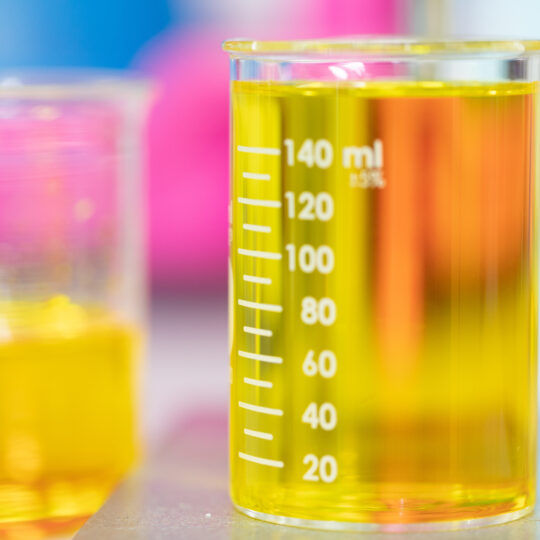Using Minerals to Filter Renewable Biodiesel Fuels
How Diatomaceous Earth Benefits the Process

In the constant search for clean energy, biodiesel has become a prominent fuel alternative. While this solution has its advantages and disadvantages, there are ways to help combat some of the cons. Learn how minerals help to filter biodiesel fuel and make this renewable option even better.
What Is Biodiesel?
The short answer: biodiesel is a renewable, biodegradable fuel that can be used in vehicles and equipment.
The long answer: while standard fuel—petrodiesel—comes from petroleum, biodiesel is made from biomass oils that come from:
- Plant oils (soybean, canola, or corn oil)
- Used cooking oil
- Animal fat
- Algae
Biodiesel is produced by a chemical process called transesterification. These natural fats and oils are combined with alcohol and a catalyst (such as sodium or potassium hydroxide) to create fatty acid methyl esters (FAME). However, once it’s produced, biofuel still needs to go through a purification process before it’s used to filter contaminants that could cause clog an engine and pipes.
How Biodiesel is Used
There are many uses for biodiesel. As a renewable fuel, it’s widely used throughout the transportation industry, powering cars, trucks, and other vehicles. However, any equipment that requires fuel can also use biodiesel to power generators, provide heat, clean metal, and more.
In order for biodiesel to be used, it first needs to be filtered to remove excess contaminants and production chemicals. There are several ways to go about this purification process:
- Wet washing: fuel is sprayed with a fine mist, removing impurities as it settles.
- Dry washing: silicate powder neutralizes contaminates.
The dry process has proven to be quicker, more cost-effective, and better for the environment. There are questions around how to properly dispose polluted water from the wet washing process. However, the dry washing silicate can be reused.
Benefits of Biodiesel
As a fuel source that can be made from recycled grease and other natural oils, biodiesel is both versatile and eco-friendly. But the benefits go even further than that.
- Reduced pollution: An engine burning clean biodiesel emits fewer pollutants, including hydrocarbons, carbon monoxide, and particulate matter.
- Superior performance: Its high cetane rating makes it easier for an engine to start. As a lubricant, it puts less wear and tear on your engine over time. Even a small amount of biodiesel blended with petrodiesel can increase lubrication.
- Renewable energy: As long as we can produce plants like corn and soybeans, we can create biofuel. This sustainable option lowers our dependency on limited fossil fuels.
- Safe: If there’s ever a spill, biodiesel causes less damage than petroleum-based diesel. It’s also less combustible and easier to handle.
While there are many benefits to biodiesel, it’s not a perfect product. As with any fuel, there are certain factors to consider before making the switch.
Biodiesel Disadvantages
Even as biofuel is becoming a popular alternative, petrodiesel is still the standard choice for many consumers. This may be because of some of the following biodiesel drawbacks.
- Temperature: If it’s too warm, mold can form in this biological material. It also transforms into a gel if it gets too cold, hindering performance.
- Storage: Biofuel thickens when exposed to oxygen for too long.
- Deposits: Since it’s more lubricating, it can also leave more deposits in a fuel tank and pipes, leading to clogs.
Fortunately, you can combat some of these problems with regular maintenance and frequently replacing fuel filters. Filtering biofuels are not only important at the production process, but it can also help keep the fuel and engine components in top condition. The kinds of filters you use also make a difference. Here’s where minerals come in handy once more.
Using Minerals to Filter Biodiesel
Remember when minerals were used during the dry washing process? They can be used again to keep clog-creating deposits out of biofuels so the fuel tanks and pipes stay clear. When using biodiesel, many vehicle and equipment manufacturers recommend changing filters more often. But these filtering agents can be just as naturally beneficial.
Diatomaceous earth is one natural option used to help filter renewable biofuel. This absorptive mineral filter aid is lightweight and porous, creating an optimal method of removing contaminants, preventing clogs, and creating a cleaner fuel source.
Biodiesel Minerals Filter from Dicalite
Dicalite supplies diatomaceous earth minerals to filter animal and recycled oil and fats used in the biodiesel production process. We also provide the renewable biofuel market with other natural mineral options such as perlite and cellulose.
Our minerals are sourced from our mines and processed at our facilities across the U.S. Since we own and operate each location, we’re able to maintain a high level of quality control and product consistency. This means our customers can rely on our products to remove unwanted contaminants for cleaner fuels and a more efficient flow.
If you’re still wondering whether biofuel is the right choice for you, consider the many eco-friendly benefits. Then contact Dicalite for more information on how we can help make the natural process even easier with a diatomaceous earth filter aid.
Join Our Mailing List
Our blog offers insight and information about new and exciting uses for perlite, diatomaceous earth, and vermiculite deriving from years of research and application. From passive fire resistance to mineral depth filtration, by subscribing to our mailing list, you will receive the latest information surrounding the Dicalite, Dicaperl, and Specialty Vermiculite brands and products.